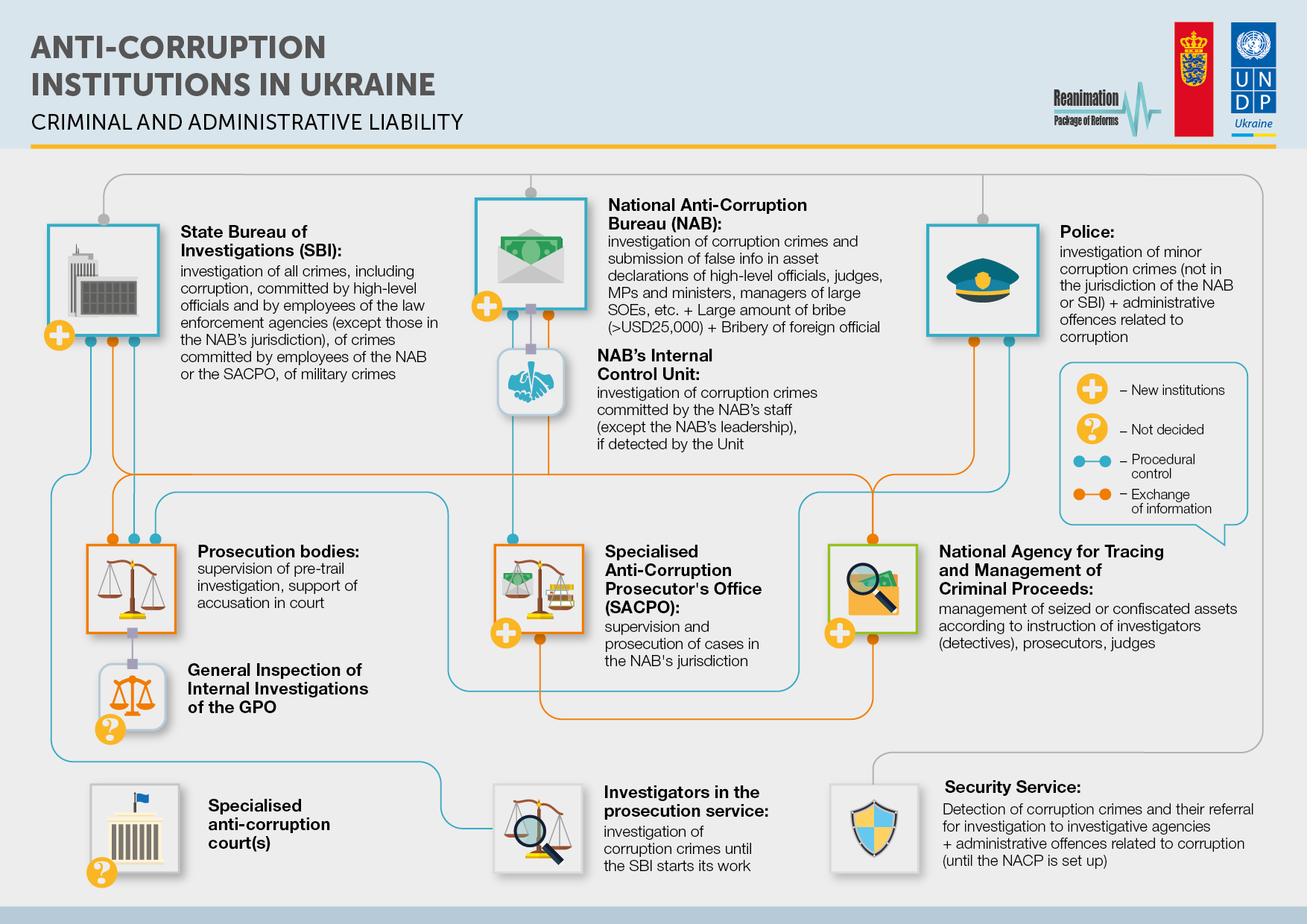The question to which extent Ukraine has progressed in fighting corruption and how much more needs to be done, is at the core of the country‘s reform politics. Ukraine has, under heavy pressure from international partners and donors and a maturing civil society movement, adopted measures to reduce corruption in all fields of government and the economy.
These measures are showing first results. Anti- corruption legislation has been adopted, a number of key institutions have been established, and measurable improvements have been achieved in the field of public procurement.
Much, however, needs to be done to reduce corruption in Ukraine to such levels where business can prosper, foreign investments will be encouraged, and public service delivery will gain in quality and non-discriminatory accessibility. As long as corrupt schemes and networks retain power and influence, international pressure is crucial to make anti-corruption reforms in Ukraine credible and irreversible.
Context
Since the Maidan revolution and the launch of the comprehensive reform efforts, the need to address and reduce corruption is named as one of the top priorities. Combatting corruption has become a key conditionality even in negotiations with the IMF – something which has not been heard of earlier. What has already been achieved over the past three years, and what major challenges need to be addressed next?
Measurable progress can be recorded in the changed attitude which the population shows with regard to tolerance of corrupt behavior. Here, surveys suggest a considerable rise in the readiness to complain against corrupt behavior. The number - and power - of civil society organizations working in this field has seen a remarkable rise.
When discussing "anti-corruption reforms" in Ukraine in the current context, this comprises the full range of public and private sector governance. It refers to legal and institutional reform in the public sector and includes political parties, the judiciary, and law enforcement agencies, tax and customs, as well as state-owned enterprises.
It also addresses anti-corruption instruments in the private sector. Companies are now required to introduce compliance pro- grams and officers in order to be eligible for bidding in public procurement tenders, and the quality of compliance mechanisms will be considered in case of investigations against a firm. The list of institutions and legislation which have to be established and implemented has been prescribed in agreements with international donors and partners, with the EU - Ukraine Association Agreement, the Visa Liberalisation Action Plan and the IMF program as the most prominent ones.
Read also: Ukraine's fight against corruption, explained
What has been achieved, and what not
Dedicated anti-corruption legislation has been adopted and key institutions have been established.
The National Anti-Corruption Bureau (NABU) is operational since April 2015. Its mandate is to expose and investigate corrupt acts conducted by officials. In the period since its inception it has already proven its effectiveness and has filed lawsuits in more than 200 cases.
The National Agency for the Prevention of Corruption (NAPC), established in late 2015, is responsible for collecting and verifying the declarations of assets of public officials and preventing conflicts of interest by public officials. The launch of this function was at first marred by a hefty controversy when the system for filing asset declarations was ridiculed by a range of faults and exemptions which had rendered it basically toothless. After heavy pressure from international partners and the domestic public, all high-ranking public officials have now filed their declarations by 31 October. The next controversy is now emerging around the question how to verify the information declared and how to sanction illegally obtained assets.
Read more: Ukraine's elite-exposing e-declarations, explained
An Anti-Corruption Prosecutor’s Office has been formally established but needs to become operational. Establishing Anti-Corruption Courts is recommended by the Council of Europe’s Venice Commission, although this is not yet a formal requirement for the government.
Another institution, not formally included in the list of anti-corruption institutions is the Business Ombudsman which during the period since opening office in May 2015 has managed to resolve about 350 cases of ca. 800 complaints received, many of them relating to the unfair treatment of business by tax authorities.
A number of tools have been launched to improve access to government data and information to the public.
These tools exploit the potential which modern IT and ‘big data’ are offering. Some of them have been developed and are implemented in close cooperation with media and civil society to ensure that this information is brought to use for public oversight and accountability.
The latter can help to improve competition and equal opportunities for businesses by making it easier to identify firms which are operating despite convictions, tax debts, etc. which would rule them out of competition.
Public procurement - a success story
Remarkable progress has been achieved in driving corruption out of public procurement. The electronic procurement platform ProZorro is widely recognized as a major achievement and has won recognition even in the international arena. Developed initially by a coalition of experts from Ukrainian and international civil society organizations and business, it quickly won the support of the Ministry of Economy.
Since August 2016, the use of ProZorro is mandatory for all public procurement by the central government and has also been adopted by the administration of the capital Kyiv.
Other tools applied to clean up public procurement have been the use of external agents to procure goods on behalf of the government. UN Agencies and a Brit- ish organization are buying pharmaceutical drugs on behalf of the Ministry of Public Health. This has helped to cut costs for cancer drugs by 25% overall.
What challenges remain
It is beyond doubts that important institutions have been set up which, in some cases, have already proven their effectiveness and have written some success stories. It can be argued that it will no longer be possible to “accept” corruption in Ukraine as an inevitable factor of “how things are done.”
No high-ranking public official has been brought to justice as of now and cronyism remains an important aspect of the political system. Success in saving public funds through better public procurement is contradicted by the miserable rates of returning embezzled funds to the budget. The state budget had planned for revenues from asset recovery in the range of $300 – 400 mn in 2016-2017. Of these, only ca. $3,000 were collected in 2016.
To address one of the manifold reasons for corruption, civil servants need to be paid better salaries, their job descriptions need to be clarified and their performance be better controlled in the scope of a civil service and administrative reform. International pressure to implement credible anti-corruption reforms needs to remain high and imperative as long as representatives of old and new corrupt schemes and networks retain the power to influence the government and economy of the country.





